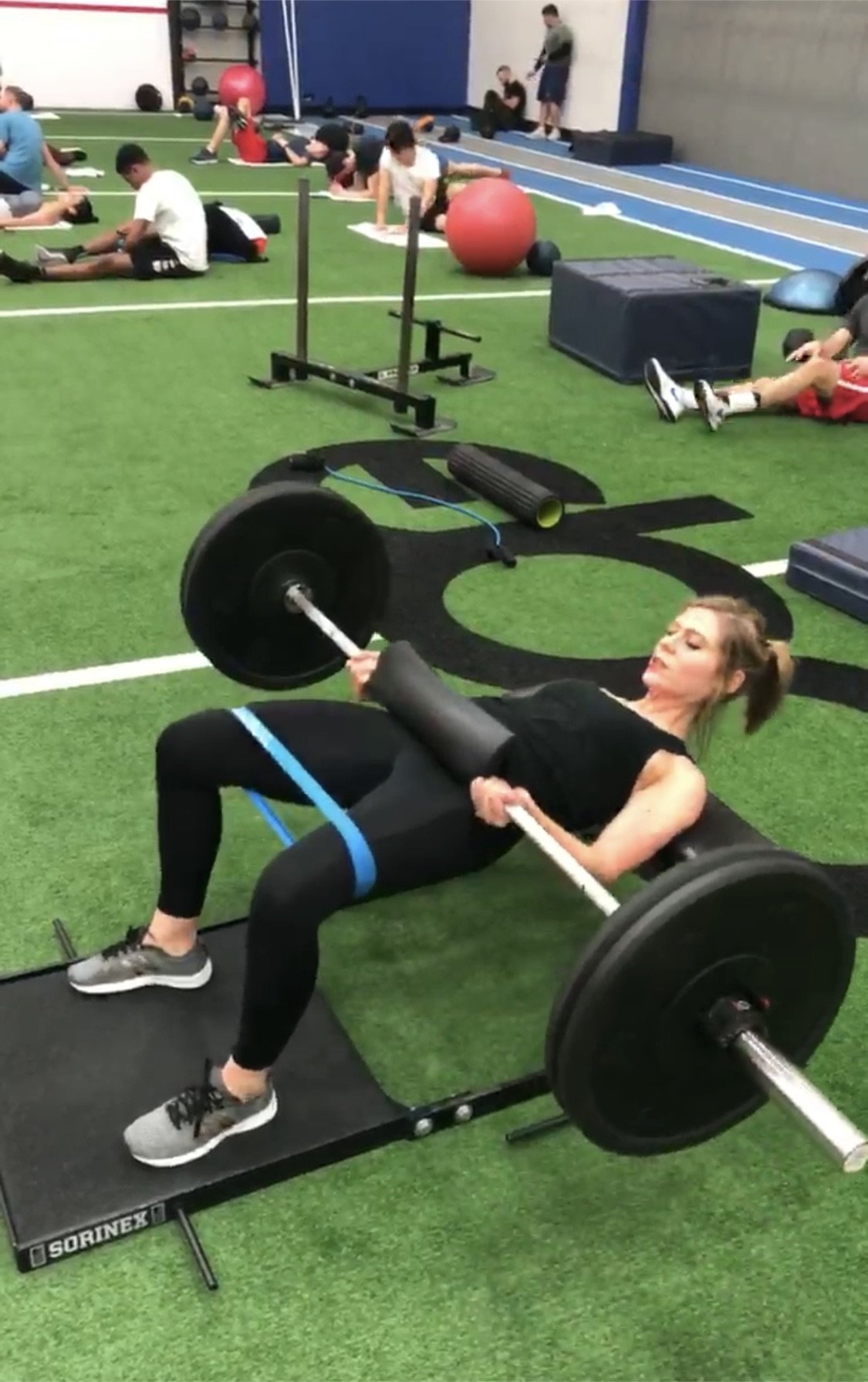How Gym Class Failed Us
I wish there was a section in gym class that said "This is your brain on vegetables”
On an always suffocatingly humid day, my feet would clop clop clop along the track. Both my hair and heavy cotton school issued P.E. shirt clung to my body as though they were going to be inadvertently left behind. Sweat stung my skin, skin that was tomato red within the first quarter mile. I gasped and gulped for air, furious with myself for not concocting a reasonable excuse to get out of gym class today, the run the mile day.
In gym class, I learned that exercise was something to slog through, an uncomfortable pain that should bring you ---this--- close to unconsciousness. And if that wasn’t available, the mortification du jour was on the menu via dodgeball or some other competitive game that always gave the boys the advantage. Either way, consider yourself cooked to perfection.
Warmup before running the mile consisted of a few can-can kicks and maybe a brief tricep stretch behind the head for no logical reason at all. Bend over, bounce towards your toes a few times, a couple standing spinal rotations to the left and right… and we’re off! As my sports involved peers glided down the lanes, I was left to assume I just wasn’t born athletic. It was clearly a gene you either had or had not, and a gazelle I was not. The evidence compounded when you’d see siblings who were both athletic or vice versa-- Wonder Woman status was obviously granted in the womb.
I was too young to realize that the kids who were doing exceptionally well in gym class were also likely practicing regularly in extracurricular sports, getting exposure to exercise and movement in a proper way that gave them the edge. My exposure to physical activity taught me that it was awful. And if that was my experience when I was doing it with my friends in gym class, you can guarantee I wasn’t about to choose to do that to myself on my own time, no ma’am, no thank you, huh-uh. I saw no benefit. I felt sweaty and sick, and my level of coordination only exacerbated already burgeoning confidence issues. Embarrass myself AND feel sick at the same time? Hard pass, thanks.
You mean there are ways to exercise that won’t make feel like vomiting? You’re kidding?
And I wasn’t obese or overweight. I was a normal kid who liked to play outside, but was quite introverted so I didn’t gravitate toward group activities with beaming excitement. I didn’t dislike gym class, per se, either, it certainly helped give me a mental break from schoolwork. But I looked forward to it not because of what it offered me, but because it was an hour without the harsh scrutiny of my skills in recall, memorization, essay writing, or speaking in foreign tongues. I imagine the kids who were overweight or obese have an even more stinging memory of the experience. Kids’ brains can’t handle 7-8 hours of book work, but because parents have to work, kids have to be in school for a full day. Gym class was merely the time to give brains a break.
It took me another decade to reintroduce myself to physical activity. After graduate school I found myself suddenly being desk bound for most of the day and not having the salad bar at my beck and call. I was gaining weight quickly. I knew I had to exercise it away, but I wasn’t sure exactly how so I turned to what I thought would be the easiest on a technical level: running.
It wasn’t a whole lot different than gym class. I didn’t prep my body well for it, and still slogged through. But I did start feeling a sense of accomplishment as I worked alone, and when I started pairing proper nutrition with it, I could see my body change. I felt more calm, more relaxed, more in control of my mood and day. I also had a roommate who was a great influence on how I cared for my body, how I respected it, how I supported it through food. The more I learned about proper fitness and nutrition, the easier it got. I still lament the decade I lost to feeling incapable of being someone who can do physical activity, but I am relieved everyday that I eventually started. I’ve found things that I enjoy, that give me a sense of mastery, help my mental health and wellbeing, and help make life in general a bit easier. I have found exercise to be so profoundly important I proselytize it through my career choice.
Learning how to take care of your body for life is, like, a really, really big dill guys.
We do children an incredible disservice by having their first exposure to their health and wellness feelings of discomfort, with no understanding of what’s actually happening to the body in that process. And how does that week on square dancing help me connect to my body in a way that will help me live a long and healthy life? Do we not think to teach kids how exercise affects the body as we grow and age? Or what a healthy diet should look like? It doesn’t have to be an intensive science class, but an interesting video on looking at the human body given proper nutrition and exercise vs one that doesn’t? I think seeing that visually would’ve been helpful for me. I got one semester of health class in high school, nutrition covering exactly one chapter. I don’t recall it ever being said: what you eat, and how you move your body, directly affect how you think and how you feel. We are really missing out on a huge opportunity to affect the health of the country.
You mean to tell me the more colorful foods I eat, the more I can focus, be calm, and even manage my weight? Who knew?
According to the CDC, in 2017-2018, the prevalence of obesity was 42.4%. And that was before a global pandemic that saw self-reports of unwanted weight gain soar. Heart disease, stroke, type 2 diabetes, and certain cancers are obesity-related conditions and among the leading causes of preventable, premature death. These are diseases of lifestyle, choices you make, diseases that through a teensy bit of discipline, are largely avoidable. In 2016, obesity carried an economic cost of about $260.6 billion. This includes everything from treating obesity, to the value of lost work, to higher insurance premiums. In 1998, obesity was responsible for about 6 percent of medical costs ($42 billion), and by 2006 it was responsible for about 10 percent of medical costs, or $86 billion. This figure doesn’t even include people residing in institutions, who may be in worse health than the general population, so it’s estimated that the actual cost may be closer to $147 billion (data from the Medical Expenditure Panel Survey). Further, some estimates find that per capita, obese individuals spend anywhere from $1,429-$2,741 more per year than non-obese individuals.
And consider this: a lot of the adults who are obese today weren’t obese as kids. Unfortunately, what’s worrisome is that childhood obesity is on the rise at never before seen rates. In 2017-2018, the prevalence of childhood obesity was 19.3%, or 14.4 million kids, or better yet: 1 in 5 kids is obese today. This is not including those who are overweight. And we know that children who are overweight or obese have a much, much, greater difficulty eventually losing weight than their non-overweight peers due to changes in the brain and body that make weight loss an even more uphill battle than it already is. Looking down the barrel, where does this leave the state of American health in 20-30 years when these children are grown and know obesity as a way of life? And I’m sure with our totally affordable U.S. health insurance, access to quality medical care, and $300+ million spent on pharmaceutical lobbying, we’ll get this squared away and taken care of in no time…
And we have got to understand that there is a direct correlation between diet and mental health and wellbeing. It should come as no surprise that with childhood obesity rising we’re also seeing mental health issues in children and teens follow suit. The 2020-2021 report on youth mental illness from Mental Health America states that over 15% of 12-17 year olds reported at least one major depressive episode within the last year. Keep in mind that we also know that people who are affected by mental illness are more likely to turn to substance use to self-medicate. So now we’re compounding issues that, in a lot of cases, are largely avoidable. Where will these kids be in a decade?
I grew up in an era where the combination of packaged goods, convenience foods, and scientifically designed addictive food plumed through society with the effortless ease of selling popcorn at a movie theater. Lunch was brought to you by Little Debbie and similarly high value commodities you could take to the trading floor. We’re inundated with brilliant marketing, tasty treats, and an overworked, overstressed American body looking for comfort and cheap convenience where we can get it, but to what end?
I’ll take your diet soda, cigarettes, and diet pills, and trade you a plank - trust me, sweetie, you’ll feel much better
I hear some gym classes are now incorporating sections on yoga and even breathwork. That’s a start, but why aren’t those presidential standard tests more to do with having a basic understanding of what proper diet and exercise can do for the body, how movement serves the body, and how nutrition nourishes and supports the body? I’m a fan of having visuals to show people what happens to the human body when we eat healthy vs unhealthy, but part of the program could also be devoted to some kind of basic strength training that teens can do, and movement that teaches young children how to connect to their body. Like with anything, first impressions matter.
What would’ve been more helpful in high school could’ve been something as simple as, “hey, here’s how exercise can alleviate anxiety,” or a list of commonly accessible foods that can help boost serotonin naturally and mitigate mental health issues. Or “hey, let’s learn how exercise can help maintain your weight better than diet coke and cigarettes.” I wish I would’ve known how profoundly lousy sugar can make someone feel. It’s more important than ever that we connect what we eat, and how we move our bodies, to how we think and feel. What you eat, and how you move your body, affects what you think and how you feel.
The introduction to movement matters, our first experiences and exposure to exercise will lay the foundation for how we move and feel for years, why are we making it so hard on kids? Even focusing on breathwork or meditation for a week will—and I guarantee you this—have better benefits to the human body than lessons in square dancing. Because here’s the thing, once you know the power of diet and exercise, you don’t forget it. We may stray from time to time, but our bodies always want that homeostasis, that bit of nurturing discipline. Our bodies want to be well taken care of, and had we all learned that as children, where would we be today? Because I still haven’t found myself partnering up with a diet of do-si-do’s and cowboy hats.
Girls! Need! Strength! Training!






